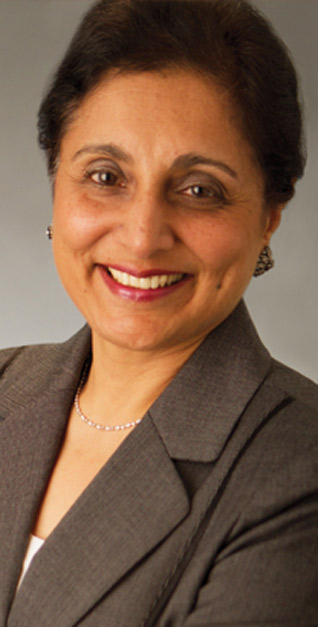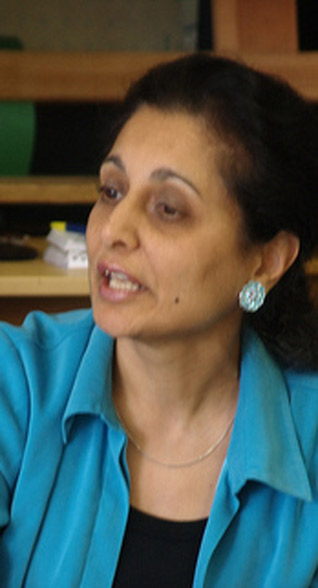People
She Found Her Voice in Advocacy:
Baljinder Kaur Narang
CRAIG TAKEUCHI
It was religion that taught Baljinder Kaur Narang that she could not discriminate against queer people.
And in turn, she found her own voice by advocating for queer people.
"As a Sikh, we pray every day and people who believe in the faith pray every day for the wellness of the whole community," the Ugandan-born Burnaby Board of Education chair said. "So that means everyone. So if I'm praying every night for everyone's well-being, then everyone includes everyone … If they're people, they're people."
And that, she said, includes LGBT people.
It was the board's fight for antihomophobia policy 5.45 in 2011 that put her beliefs to the test.
"When I came on board and I said, 'This is clearly an issue that people want addressed, so why don't we do it?,' " she said. "That was very much the thinking about the table: 'Let's do it.' When the whole thing started falling apart, we kinda thought …'Why are we doing this?'," she says, chuckling. "And we thought 'Okay, we're doing this because it's the right thing to do. So if we go down in history as all losing our seats, then at least we'll make history!' "
Although she can laugh about it now, the experience was a difficult, albeit transformative, one.
One of her biggest challenges was wrapping her head around the views from opposition, which came from a group called Parents' Voice.
"I couldn't understand it … I am a woman of colour, I'm dealing with being female, I'm dealing with colour, I'm dealing with [being a] minority, and I am expecting to be treated like a full-fledged Canadian," she said. "So why should you not have that same privilege? I was looking at it very much as a human rights issue. [If] I want my privileges then why am I denying you yours? It makes no sense. If I want to be respected for who I am, then what right do I have to say to you that you're not worthy of respect?"
Why the controversy arose in that particular school district completely confounded her.
"I cannot for the life of me understand why Burnaby? … That's the question I haven't figured out yet. What was the need for so much activity around a policy that other districts have just passed without any problem? So that puzzles me."
As a result of the experience, she said she became empowered and learned to speak out.
"I think it's made me a lot stronger. I would not have had this conversation … a few years ago because I would've been terrified of saying anything … but I think that I'm [now] comfortable in saying what I said. And if people take offense, then you know what? It's okay … It made me feel that yes, it's okay to be a voice and be heard if you're advocating for the right reasons … and you don't have to please everyone."
Although she said she feels there is a "huge denial happening" in South Asian community about queer issues, she said she did not receive any protests from the community either.
"In the last election, I was actually very impressed with the South Asian community because no one lobbied me on … my stand … If they had concerns, they didn't send them my way. But they also ignored me."
In spite of all the "drama", she said she recognizes the good that eventually did come out of the intense controversy in passing the policy.
"How do we as straight people force ourselves to think about concerns those who are not straight may have? ... I think for me, it would be important to have that motivation to try and talk about these issues. So from that point of view, I guess I'm really glad 5.45 happened for us in Burnaby because it really made the community think. It forced them to think about the issue that we hadn’t thought about. From that point of view, Burnaby actually did a great job in terms of bringing the issues right to the forefront and saying 'Okay,what are we going to do? Are we going to stick together and respect each other or are we going to tear each other apart?' And you know, we did stick together. That was great."
Ultimately, she feels that straight people have a responsibility towards helping out queer people.
"I think we owe it to our future generations, our communities, to actually reach out and connect with the LGBTQ community … Why is it taking us to long to get around to accepting [them]? So people like us have a duty to advocate for people who need our support."
[Courtesy: Georgia Straight]
August 3, 2013
Conversation about this article
1: Bhai Harbans Lal (Dallas, Texas, USA), August 03, 2013, 11:36 AM.
I was waiting for someone from our community to come forward and Baljinder did, alongwith a few more young men and women who preceded her. Our granthies and jathedars did not understand the issue and spoke against the equal rights pre-maturely. Let there be more debate on the issue to clarify the Sikh viewpoint. I predict that many will support Baljinder's views.
2: Harinder Singh (Bridgewater, New Jersey, USA), August 03, 2013, 1:41 PM.
Seva (service) is about dignity and relevance. Baljinder bhainji leads two educational organizations (Burnaby school district and Sikh Research Institute Canada) which are addressing real community needs while pushing the religious and political laws, status quo. More power to her especially since her leadership is based on Sikh value system, not popularity contests of her constituents.
3: Manmeet Singh Sandhu (Surrey, British Columbia, Canada), August 03, 2013, 7:53 PM.
Baljinder Bhain ji's seva and commitment to the panth have been amazing. She was instrumental in bringing "The Khalsa Raj" exhibition to Vancouver a couple of months ago. Her work with the "Panjab Digital Library" has been exceptional ... it is engaged in preserving the rich heritage and culture of Punjab.
4: Gurpal Singh Bhuller (Chester, Virginia, USA), August 09, 2013, 10:44 AM.
Baljinder bhen ji has been a role model for Sikh women in North America. Her advocacy and her level of involvement is to be admired. This is what true seva is. She not only is helping Sikhs in Canada but all Canadians with her work at the School Board. She has taken a courageous (and in my opinion, the correct) stand on LGBT issues and deserves our support. Just because these issues are controversial does not mean they should not be addressed. They should be, not only from the social and moral angles, but also from the theological side.




